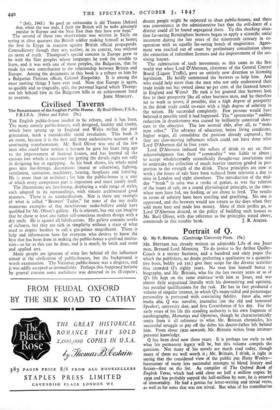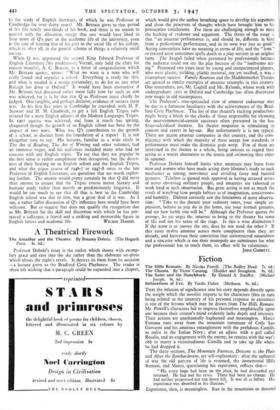Portrait of Q Q. By F. Brittain. (Cambridge University Press.
15s.) MR. BRITTAIN has already written an admirable Life of one Jesus man, Bernard Lord Manning. To do justice to Sir Arthur Quiller- Couch is a sterner business, and a hundred and sixty pages (for which the publishers, no doubt preferring a qualitative to a quantita- tive basis, boldly ask r5s.) give bare scope for the diverse activities that crowded Q's eighty years. No man lent himself better to biography, and Mr. Brittain, who for the last twenty years or so of Q's life kept on the same staircase' with him at Jesus, and was almost daily acquainted literally with his downsitting and uprising, has peculiar qualifications for the task. He has in fact produced a volume of singular interest, in which Q's many-sided and picturesque personality is portrayed with convincing fidelity. Inter alia, inter multa alia, Q was novelist, journalist (on the old and lamented Speaker), university don, and first Cornishman of his day. For the early years of his life the standing authority is his own fragment of autobiography, Memories and Opinions, though he characteristically omits from it all reference to what Mr. Brittain chronicles, his successful struggle to pay off the debts his doctor-father left behind him. From about 192o onwards Mr. Brittain writes from intimate personal knowledge.
Q has been dead now three years. It is perhaps too early to ask what his permanent legacy will be, but this volume compels the question. Not many of his novels are much read today, though many of them are well worth it ; Mr. Brittain, I think, is right in saying that the considered view of the public put Hefty Wesley— forerunner of many less successful attempts to blend history and fiction—first on the list. As compiler of The Oxford Book of English Verse, which had, sold close on half a million copies by 1939 and has probably topped the half-million by now, he is assured of immortality. He had a genius for letter-writing and trivial verse, as well as for some that was not trivial. But what of his contribution
to the study of English literature, of which he was Professor at Cambridge for over thirty years? Mr. Brittain gives to that period of his life nearly two-thirds of his book, and there is no reason to quarrel with the allocation, except that one would have liked to hear more of Q's part in the academic life of the university, even at the cost of hearing less of his part in the social life of his college, which is, after all, in the general scheme of things a relatively small society.
When Q was appointed the second King Edward Professor of English Literature (his predecessor, Verrall, only held the chair for sixteen months), A. C. Benson, in a letter of congratulation which Mr. Brittain quotes, wrote: "What we want is a man who will really found and organise a school. Everything is ready for this, and what is needed is a strong personality, to do for us just what Raleigh has done at Oxford." It would have been instructive if Mr. Brittain had discussed rather more fully how far such an aim was achieved, for it is by that that Q as Professor must chiefly be judged. One tangible, and perhaps decisive, evidence of success there was. In his first five years at Cambridge he crusaded, with H. F. Stewart and H. M. Chadwick, to get a full English Tripos sub- stituted for a mere English adjunct of the Modern Languages Tripos. In 1917 success was achieved, and from it much has sprung, chequered though the growth of an English school has been by the impact of two wars. What was Q's contribution to the growth of a school, as distinct from the foundation of a tripos? It is not altogether easy to say. His lectures, familiar to a wide circle in The Art of Reading, The Art of Writing and other volumes, had an immense vogue, and his audiences included many who had no concern with any English tripos. To say that they are popular in the best sense is rather compliment than derogation, but the direct- ness of their bearing on an English school and the English Tripos, and what the tripos ccurse of 1946-7 or 1947-8 owes to the late Professor of English Literature, are questions that are worth explor- ing further. The answer would pretty certainly be that Q did more than anyone to ensure that the Tripos course meant literary and humane study rather than merely or predominantly linguistic. It would be too much to say that all that is best in the Cambridge English school was due to him, but a great deal of it was. As I say, a rather fuller discussion of Q's influence here would have been welcome. But to suggest that does not qualify the recognition due to Mr. Brittain for the skill and discretion with which he has por- trayed a colleague, a friend and a striking and memorable figure in English letters and academic life. WILSON HARRIS.



































 Previous page
Previous page